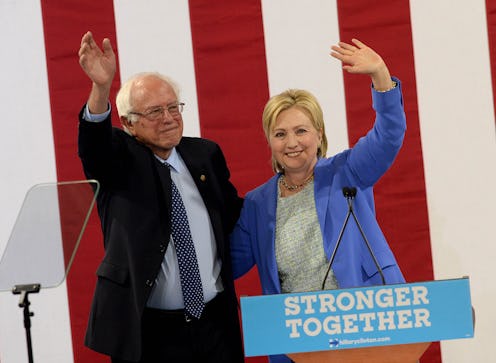News
Democrats Could Make A HUGE Change To How They Nominate Their 2020 Candidate

According to a report from BuzzFeed News, some Democratic officials are considering a major change to how their presidential nominating process works, one that would likely be well-received by the party's activist and progressive base. Namely, the Democrats might get rid of superdelegates in their presidential primary process, doing away with a polemic facet of the party's presidential primary process.
Superdelegates were a controversial element of the 2016 Democratic primaries between the eventual nominee, former Secretary of State Hillary Clinton, and her chief rival, Vermont Sen. Bernie Sanders. Essentially, they're a pool of delegates involved in the nominating process that aren't allocated through primaries or caucuses, but are rather comprised of Democratic officials who get to support whomever they please.
Historically speaking, this has never really been an issue, because the superdelegates have always ended up supporting the candidate who won the most pledged delegates. This was true even in 2008, when Clinton was the favorite candidate of the Democratic establishment, but lost the pledged delegate count to then-Illinois senator Barack Obama.
Similarly, Clinton won the pledged delegate count and thus the superdelegates in 2016, despite Sanders' reported efforts to sway them to his side. Had he been successful in flipping the superdelegates and thus winning the nomination, it would have been an unprecedented, undemocratic usurping of the will of the party's voters.
Given that the superdelegates have never actually broken from the candidate leading the pledged delegate count ― and indeed, to do so would be an overt and flagrant violation of the democratic process ― abolishing them altogether would likely be a painless and low-risk decision.
Yet, despite the fact that they've never actually determined the outcome, the very nature of the idea that the nomination can be swayed by party officials in defiance of the voters is understandably controversial, and sometimes stirs tension and division when the presidential primary season rolls around.
The Democratic Unity Commission formed in the aftermath of the 2016 primaries ― featuring both ex-Clinton and ex-Sanders backers ― had already been reviewing the superdelegates, as BuzzFeed News noted, with an eye towards changing how they operate.
Specifically, they've been working on a compromise position that would see the total number of superdelegates cut by approximately 60 percent. Elected official superdelegates would reportedly still be allowed to support whichever candidate they prefer under this compromise, while unelected DNC superdelegates would have their votes bound to state results.
This would essentially mean that the ability of superdelegates to theoretically swing the nomination from the candidate rightfully winning to a runner-up would be greatly diminished, although if the DNC ultimately moves to abolish them altogether, that will no longer be a possibility whatsoever.
Although again, because it bears repeating, the Democratic superdelegates have never backed the candidate with fewer pledged delegates won in caucuses and primaries. This would be a reform intended to fix a potential problem that's never actually occurred, but has nonetheless rankled many progressives and those in the Democratic grassroots. As a simple matter of political optics, in other words, it's not at all hard to see why the DNC might want to make this move. Not everybody is in support of the idea, to be clear, with BuzzFeed News quoting at least one DNC official, Bob Mulholland, who wasn't so keen on the idea, calling it "absurd" and "undemocratic."
As such, it remains to be seen just how far party will go in reducing or eliminating the superdelegate ranks. But there's still time to sort things out, since it'll be a while before it'll actually matter again, with the 2020 Democratic primaries still years away.